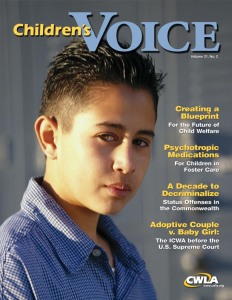Featured Article: Massachusetts works toward CHINS reform
In 1974, the Commonwealth of Massachusetts laid out plans to decriminalize four categories of juvenile offenses–failure to obey the commands of the child’s parent, failure to obey the regulations of the child’s school, habitual truancy from school, and repeatedly running away from the home of the child’s parent–and replaced them with a status offender system. From the moment the new Children in Need of Service (CHINS) system became law, advocates, the Governor’s Blue Ribbon panel, and parents all realized that the new system did not fulfill the intent of its original mandate: to provide children with the help they needed to end these behaviors.
The CHINS statute instead created an adversarial system in which the child was often pitted against his or her parent in front of a judge. Parents were encouraged to file a CHINS petition to receive help for their children, but the process and the very real potential that the parent would lose custody of their child was never adequately explained, leaving these families with a wound that often could never be repaired. For decades, neither parents nor children had the right to speak on their own behalf, and parents were not allowed to stop the petition once it was set in motion. After the CHINS petition was filed, the child was assigned a probation officer; an agreement would be drafted that would lay out specific steps the child would have to complete to end the petition, which could continue indefinitely or until the child turned 18.

Representative Paul Donato, Governor Deval Patrick, and Senator Karen E. Spika at the Ceremonial singing of CHINS reform, October 24, 2012.
These families went to the courts to receive help for their children. What their children received instead was a probation officer, a stigma, and a direct path into the prison pipeline. According to Massachusetts juvenile court records, more than 9,000 children between age 6 and 17 were funneled through this system annually. Of those, more than 6,000 youth received a probation officer and the quick induction to being a court-involved youth.
The call to change this system reached a new level when, in 2005, the Children’s League of Massachusetts filed a bill to repeal the entire CHINS system. Parents, children, experts, and lawyers testified that this system was outdated and not in the best interest of children. Families spoke of their desire to get help, children spoke of the situations that drove them to run away or act out in school, and experts educated the legislature about newer approaches better suited to working with children in these circumstances. Over the past decade, we have learned that holistic, child- and family-focused treatment plans provide the best outcomes for these children–especially to the more than 50% of children in the CHINS system who have a diagnosable mental health disorder.
Between 2005 and 2012, championed by State Senator Karen E. Spilka, the CHINS system was analyzed and reform began to take shape. Stakeholders in every corner of the state were called upon to voice their concerns with a new system, contribute their ideas for creating change, and offer their expertise on the type of system that would best benefit families and children in need of help. Guidance was also provided by observing the steps taken by other states–including Florida, New York, and Connecticut–as they implemented systems meant to handle these status offenses.
In envisioning a new system, a number of key themes for reform from the old CHINS system were identified: the provision of community-based services that families could access and receive help from on a host of issues; the creation of a standardized assessment tools to evaluate the gaps in services; the empowerment of families to have a voice in the process; and the removal of these families from the court system.
A “perfect storm” of events began to take shape in 2011, fostering hope for children and families impacted by the CHINS system. The state’s probation department was under federal investigation for their hiring practices; the Executive Office of Health and Human Services began developing Family Resource Centers, tasked with providing access to services within the community; advocates joined forces and created a powerful coalition; and the framework for true community-based services was created through the Children’s Behavioral Health Initiative (CBHI), a court-mandated program resulting from a lawsuit the state lost in 2006 that required youth with state health insurance to receive quality mental health services.
In the final moments of the 2012 legislative formal session, CHINS reform was passed by both branches thanks to the bill’s lead sponsors, Senator Karen Spilka and Representative Paul Donato. Together, their relentless dedication to reforming the system allowed them to push the bill through every legislative hurdle. Finally, on August 7, 2012, the CHINS reform bill was signed into law by Governor Deval Patrick, culminating years of research, best practices, and advocacy into one moment that will benefit thousands of Massachusetts children and their families each year.
In November 2012, as Families and Children Engaged in Services (FACES) launched its first implementation stage, citizens of the Commonwealth began to see the real impact of these changes. The court system must now inform families about the CHINS process and the possibility of losing custody, and offer a referral for community-based services for the child before the family files an application for assistance in court. The courts must also begin to utilize a standardized data- collection system in order to determine existing gaps in the system and ensure that proper services are provided.
Children and families in this system are now guaranteed a voice, the ability to work together in their home structure, and the opportunity to see change rather than criminalization. Over the course of the next two years, the state will continue to work on implementing Family Resource Centers capable of delivering the services needed for these children, and will develop a standardized intake and assessment tool so that all families receive the same quality care.
Schools will be required to develop and provide truancy prevention programs for these children prior to filing a request for assistance with the court, and will have to work toward educating all students who have been expelled. Police officers are no longer allowed to put these children in shackles, or any other restraint, nor are they permitted to bring these youth to the police station. This helps to decriminalize the system even further.
Perhaps most importantly, children will no longer have to carry the burden of the CHINS stigma. Their record indicating their need for assistance will no longer be entered into any criminal or court system, and if their application for assistance is dismissed, all records will be expunged. These cases also have a standardized timeframe, and will not be permitted to continue indefinitely, allowing children to receive the services needed and continue on with their life’s path.
The goal of this reform is twofold: to bring families together in their home communities while receiving the highest quality services to meet the needs of their children; and to create a cost-effective, research-based system to deliver the services to citizens of the Commonwealth. Advocates and government officials agree that this reform is a major step in creating a net for these children and their families. Now, all eyes turn to the state to watch this implementation unfold over the next two years –which will be exactly a decade since legislation was first introduced to repeal this broken system.
Erin G. Bradley is the Executive Director of the Children’s League of Massachusetts. She formerly worked for State Senator Karen E. Spilka, where she began working on this reform in 2005. Upon completion of her tenure in the public sector she continued to push for this reform in the private sector, first as the coordinator for the Children’s Mental Health Campaign where she formed and facilitated a broad coalition of advocates and under her current position. She has provided lectures, educational resources, and analysis on the implantation and impact of CHINS reform to a variety of stakeholders and continues to be a leading voice for children in the Commonwealth.
Purchase this Issue

Other Featured Articles in this Issue
A Decade to Decriminalize Status Offenses in the Commonwealth
Massachusetts works toward CHINS reform
Adoptive Couple v. Baby Girl
The Indian Child Welfare Act Before the U.S. Supreme Court
Psychotropic Medications for Children in Foster Care
We’ve Come a Long Way – A look at the controversial subject of prescription medications for children and adolescents
Raising the Bar for Children, Families, and Communities
National Blueprint for Excellence in Child Welfare
Departments
• Leadership Lens
• Spotlight On
Collaborative Problem Solving Equals Wide-Sweeping Change in Vermont Child Welfare
Neighbor to Family, Keeping Siblings Together
• National Newswire
Campaign Promises and Election Victories: What Do They Really Mean for Our Future
West Virginia Juvenile Drug Court Proving Successful
• Exceptional Children
Comeback… or Setback?
